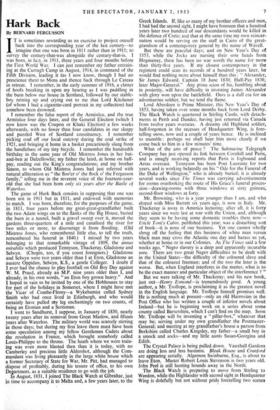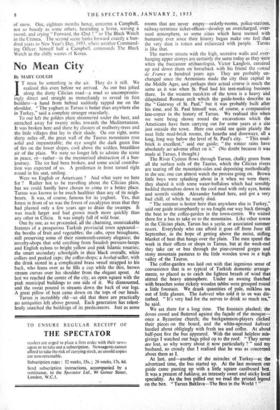Hark Back
By BERNARD FERGUSSON IT is sometimes rewarding as an exercise to project oneself back into the corresponding year of the last century—to imagine that one was born in 1811 rather than in 1911; to survey the century-that-was alongside the century-that-is. I was born, in fact, in 1911, three years and four months before the First World War. I can just remember my father entrain- ing at the Curragh Camp in August, 1914, in command of the Fifth Division, leading it (as I now know, though I had no prescience then) to Mons and thence back through Le Cateau in retreat. I remember, in the early summer of 1916, a clatter of hoofs breaking in upon my hearing as I was paddling in the bum below our house in Scotland, followed by our stable- boy reining up and crying out to me that Lord Kitchener (of whom I had a cigarette-card portrait in my collection) had somehow been drowned.
I remember the false report of the Armistice, and the true Armistice four days later, and the General Election (which I now know was the Coupon or Khaki Election) a few weeks afterwards, with no fewer than four candidates in our sleepy and puzzled West of Scotland constituency. I remember picking coal off our local outcrop during the coal strike of 1921, and bringing it home in a basket precariously slung from the handlebars of my tiny bicycle. I remember the hundredth birthday in the same year of Old Mistress Jones in her but- and-ben at Dalzellowlie; my father the laird, at home on half- pay, reading out the King's congratulations; and my brother Simon, to whom Old Mistress Jones had just referred with natural alliteration as "the floo'er o' the flock o' the Fergusson family," telling me in the reverent voice of the fourteen-year- old that she had been born only six years after the Battle of Waterloo.
The game of Hark Back consists in supposing that one was born not in 1911 but in 1811, and endowed with memories to match. I was born, therefore, for the purposes of the game, in 1811, four years before my great-great-grandfather built the two Adam wings on to the flanks of the Big House, buried the burn in a tunnel, built a gravel sweep over it, moved the gardens three-quarters of a mile and canalised the river for two miles or more, to discourage it from flooding. (Old Mistress Jones, who remembered little else, to tell the truth, remembered his funeral in 1840.) I missed by two years belonging to that remarkable vintage of 1809, the annus mirabilis which produced Tennyson, Thackeray, Gladstone and Selwyn. (Chopin, too, if you count foreigners.) Gladstone and Selwyn were two years older than I at Eton, Gladstone an austere Oppidan, Selwyn, K.S., a gentle Colleger. I doubt if I ever had the chance to play football on Old Boy Day against W. M. Praed, already an M.P. nine years older than I, and already, in his own words, "an Eton boy grown heavy." And I hoped in vain to be invited by one of the Hobhouses to stay for part of the holidays in Somerset, where I might have met the Vicar of Combe-Florey—a Wykehamist called Sydney Smith who had once lived in Edinburgh, and who would certainly have pulled nty leg enchantingly on two counts, of being an Etonian and a Scotsman. I went to Sandhurst, I suppose, in January of 1830, nearly twenty years after its removal from Great Marlow, and fifteen years after Waterloo. The military world was scarcely stirring in those days; but during my first leave there must have been some speculation among my fellow Gentlemen Cadets about the revolution in France, which brought somebody called Louis-Philippe to the "throne. The heath where we were train- ing was even more blasted then than it is today, with no Camberley and precious little Aldershot, although the Com- mandant was living pleasantly in the large white house which a former Secretary of State for War, Mr. Pitt, had managed to dispose of profitably, during his tenure of office, to his own Department, as a suitable residence to go with the job. f.n August, 1831, I joined The Black Watch at Gibraltar, just in time to accompany it to Malta and, a few years later, to the Greek Islands. If, like so many of my brother officers and men. I‘had had the second sight, I might have foreseen that a hundred years later two hundred of our descendants would be killed in the defence of Crete; and that at the same time my own reincar- nation would be serving on the staff in Cairo of the great- grandson of a contemporary general by the name of Wavell. But these are peaceful days; and on New Year's Day of 1853, while the Jocks are nursing their sore heads from Hogmanay, there has been no war worth the name for more than thirty-five years. If my closest contemporary in the regiment could scan its records of a hundred years later, he would find nothing more about himself than this : "Alexander. Sir James Edward; Captain 18 June 1830; Half-Pay 1838; later Major-General." Any pious scion of his, fumbling about in posterity, will have difficulty in investing James Alexander with glory won upon the battlefield. Ours is a dull era for an adventurous soldier, but we tend the flame.
Lord Aberdeen is Prime Minister, this New Year's Day of 1853, having taken over some months back from Lord Derby. The Black Watch is quartered in Stirling Castle, with detach- ments in Perth and Dundee, having just returned via Canada from twelve years overseas. A dreamy old Highland soldier, half-forgotten in the recesses of Headquarter Wing, is fore- telling snow, now and a couple of years hence. He is inclined to mumble : perhaps we shall hear him more clearly if we come back to him in a few minutes' time.
What of the arts of peace ? The Submarine Telegraph Company has just opened its link between Cornhill and Paris. and is smugly receiving reports that Paris is fogbound and Arras overcast. Tennyson has been Poet Laureate for two years, and is working belatedly on his "Ode for the Funeral of the Duke of Wellington," who is already buried; it is already several weeks since The Times was carrying advertisements for rooms overlooking the route of His Grace's funeral proces- sion—drawing-rooms with three windows at sixty guineas. second-floor windows at forty.
Mr. Browning, who is a year younger than I am, and who eloped with Miss Barrett six years ago, is now in Italy. Mr. Thackeray is away in America lecturing; after all, it is forty years since we were last at war with the Union, and, although they seem to be having some domestic troubles there now— Uncle Tom's Cabin, published this year, was a disturbing sort of book—it is none of our business. Yet one cannot wholly shrug off the feeling that this business of white man versus black man may cross the Atlantic one day and harass us yet. whether at home or in our Colonies. As The Times said a few weeks ago, "Negro slavery is a deep and apparently incurable sore. There are two great Negro difficulties to be dealt with in the United States—the difficulty of the coloured slave and that of the coloured freeman; and of the two the later is the worse. But, when England interferes in the matter, what is to be the exact manner and particular object of the interference ? "
But we were talking of Mr. Thackeray; and his new book. just out—Henry Esmond—is tremendously good. A young author, a Mr. Trollope, is proclaiming it as the greatest novel in the English language. Mr. Trollope himself promises well. He is nothing much at present—only an old Harrovian in the Post Office who has written a couple of inferior novels about Ireland—but he is beginning work on a series about some county called Barsetshire, which I can't find on the map. Soon Mr. Trollope will be inventing a "pillar-box," whatever that may be; serving under my own grandfather the Postmaster- General; and meeting at my grandfather's house a parson from Berkshire called Charles Kingsley, my father—a small boy in a smock and socks—and my little aunts Susan-Georgina and Edith.
The Crystal Palace is being pulled down. Vauxhall Gardens are doing less and less business. Bleak House and Cranford are appearing serially. Algernon Swinburne, Esq., is about to leave Eton. Master Robert Louis Stevenson is two years old. John Peel is still hunting hounds away in the North.
The Black Watch is preparing to move from Stirling to Weedon, while the Highlander with second sight in Headquarter Wing is dolefully but not without pride foretelling two scenes
of snow. One, eighteen months hence, concerns a Campbell, not so beastly as some others, bestriding a horse, waving a sword, and crying " Forward, the 42nd "to The Black Watch in the Crimea. The second scene harks forward exactly a hun- dred years to New Year's Day, 1953, where another Command- ing Officer, himself half a Campbell, commands The Black Watch in the chilly wastes of Korea.































 Previous page
Previous page